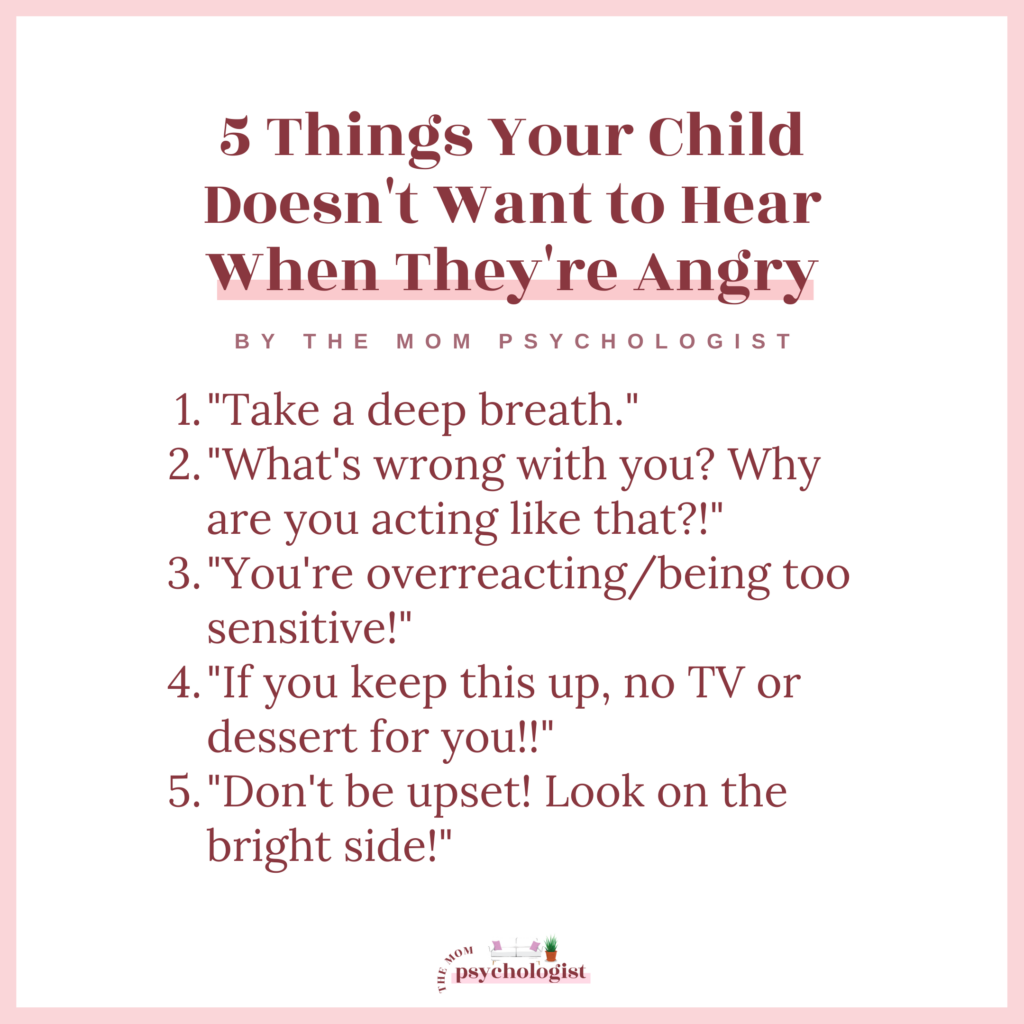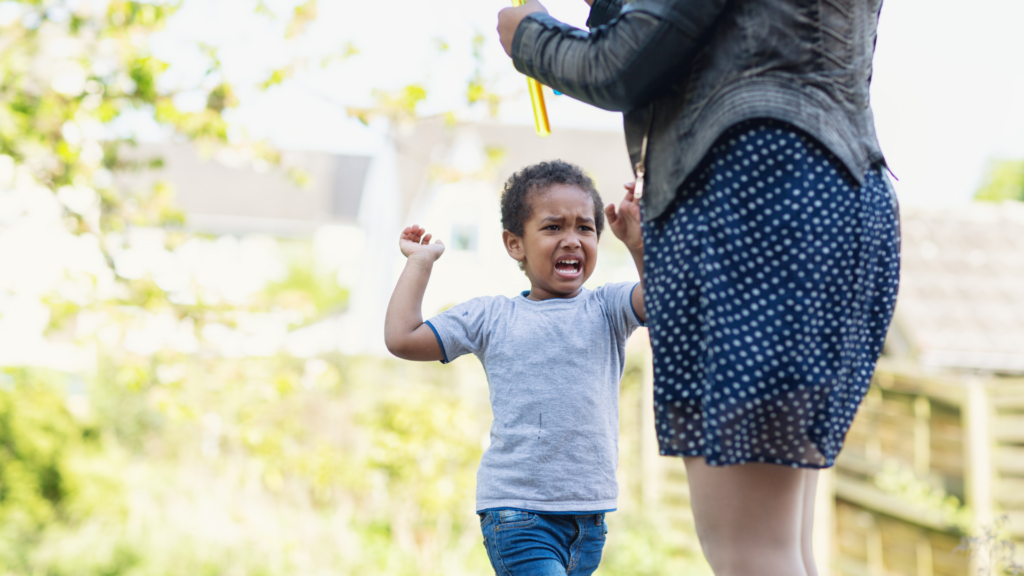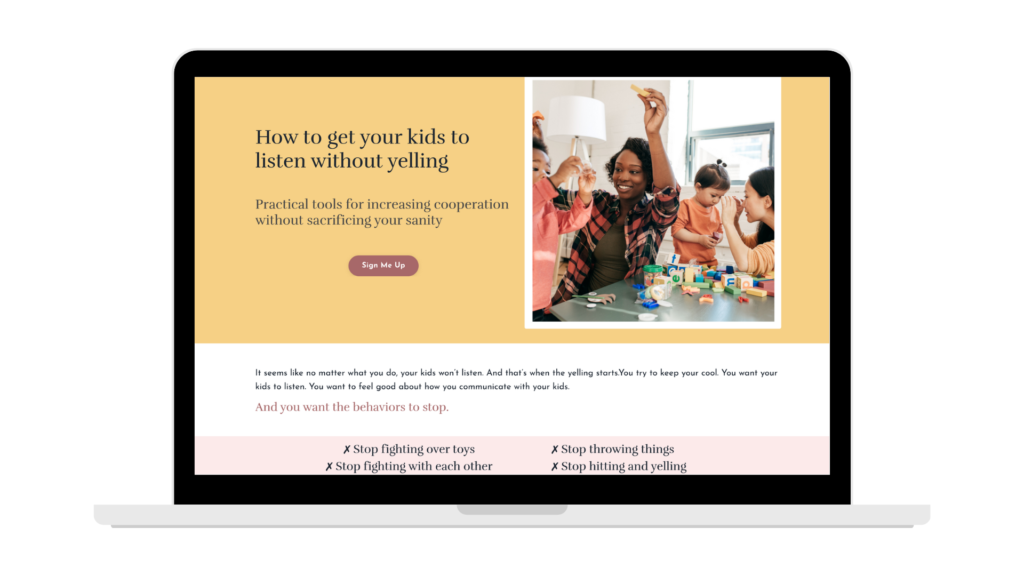watch now!
A place where I discuss all things related to toddlers and motherhood!
Subscribe to my Youtube channel
As a clinical psychologist, published author, and mother to two cheeky young children, I get it. I’ve spent YEARS researching and filtering through the noise online, so you don’t have to.
PARENTING TIPS
POTTY TRAINING
ANTIRACISM
PLAY
Blog Topics
SIBLING RIVALRY
SCREEN TIME
TANTRUMS
DISCIPLINE
Hi I'm Dr. Jazmine
5 Things Your Child Doesn’t Want to Hear When They’re Angry
topics:
Rather listen? Here’s a link to this episode on my podcast!
Navigating our children’s intense emotions can sometimes feel like we’re walking on eggshells. Here’s what to avoid saying to an angry child & why.
1. “Take a deep breath.”
A common mistake is encouraging kids to practice a coping skill in the heat of the moment. Of course, we all want our kids to practice healthy coping skills when they’re triggered but this really needs to be self-initiated. No one likes to feel controlled, especially when they’re already experiencing an intense emotion.
So instead, say….
“We’re having a hard moment right now. I’m going to take a deep breath to help calm my body down…” If they join you, great. If not, no problem.
Kids are more likely to join in when you’re doing it with them + they don’t feel forced.
2. “What’s wrong with you? Why are you acting like that?!”
I know anger is an intense emotion and it can sometimes feel like it comes out of nowhere or is triggered by seemingly small things but…
These types of questions don’t lead to a solution + often induce shame + disconnection + defensiveness.
Also, please keep in mind…
Young kids don’t often have the maturity needed to reflect about their choices and communicate their underlying issue or need, especially in the heat of the moment.

So instead, try saying something like…”Wow, you’re really upset about this. When you’re ready, I’d love to hear more about what’s going on for you + what you need.”

3. “You’re overreacting/being too sensitive!”
I know that especially with young children, their responses to things can seem a bit outlandish. One minute they’re happy and cooperative and the next minute they’re triggered because you gave them the red cup and not the green one.
While it’s often tempting to try to correct their responses to things, it’s not what they need to hear in the moment and it only adds fuel to their fire.
4. “If you keep this up, no TV or dessert for you!!”
Threats and ultimatums never work to diffuse the situation and usually only add fuel to the fire because now your child feels pressured and punished.
Consequences are best when they’re:
- Planned ahead of time
- Communicated in advance to your child
- Not done in anger
- Aligned with their age + development
Check out my free discipline workshop if you need more help with improving cooperation?

Watch my free discipline workshop for practical tools for increasing your child’s cooperation without having to resort to all the things you hate like yelling, threatening and punishing!
You’ll learn:
- How to stop the cycle of constantly having to yell when you need your child to stop doing negative behavior.
- How to help calm your child’s intense feelings (like anger and sadness) and teach them healthy social and emotional skills so they thrive in *all* settings.
- Step by step guide to better cooperation & connection using my research-based framework.
5. “Don’t be upset! Look on the bright side!”
When your child is upset, trying to talk them out of their feelings won’t work because their emotional brain is in charge. Thus, this phrase will come across as dismissive.
Sure, you may decide to take some time help them adjust their perspective but wait until they’ve calmed down first.
Oftentimes the cure to anger is feeling understood.
The best form of anger management for all of us is being heard.
Was this helpful? Save it for later!

Leave a Reply Cancel reply
Copyright The Mom Psychologist® 2025
grab my free script pack!
explore
work with me
information
About
Blog
YouTube
Podcast
Privacy Policy
Terms of Use
Product Disclaimer
Contact
TMP Times (Newsletter)